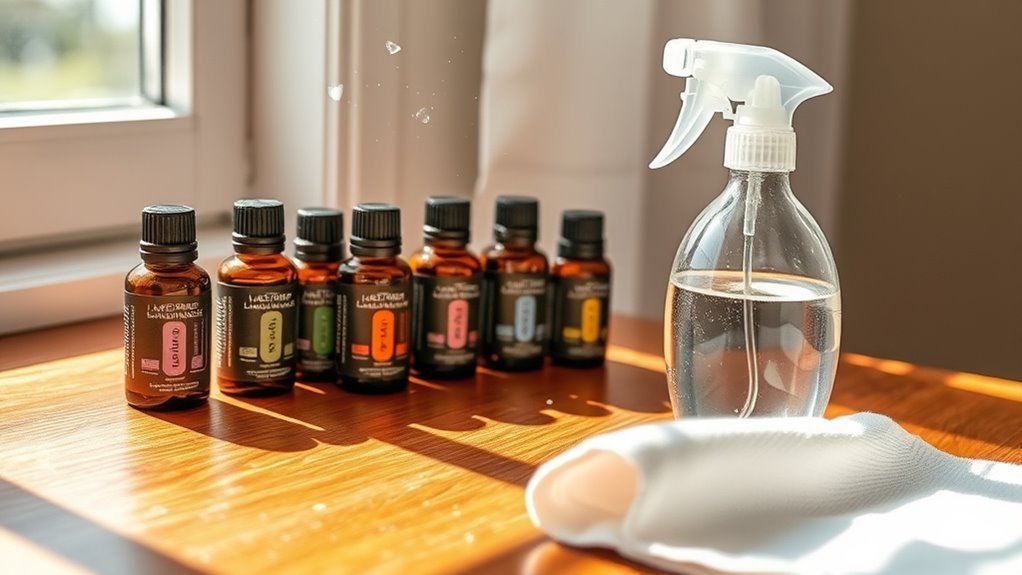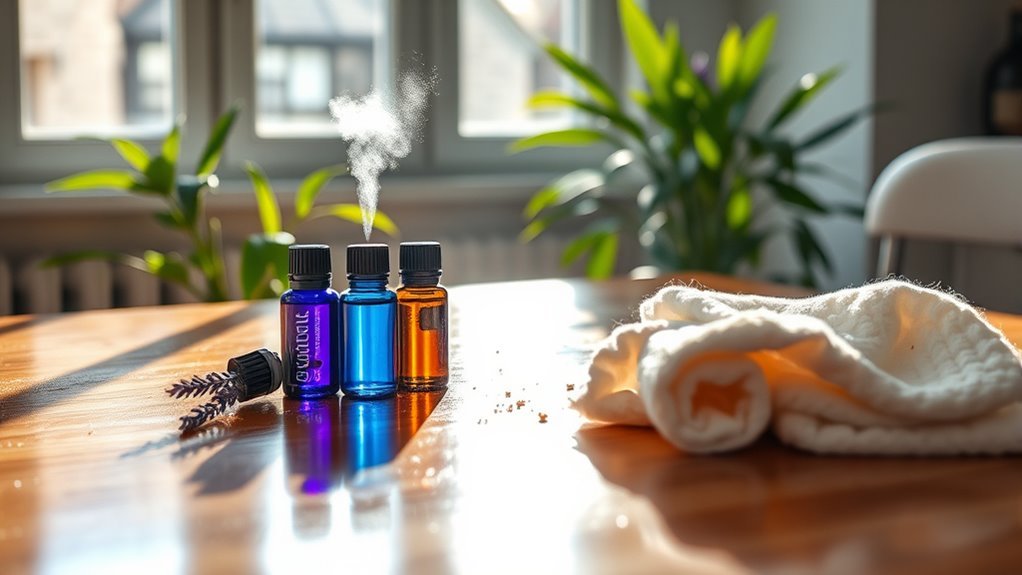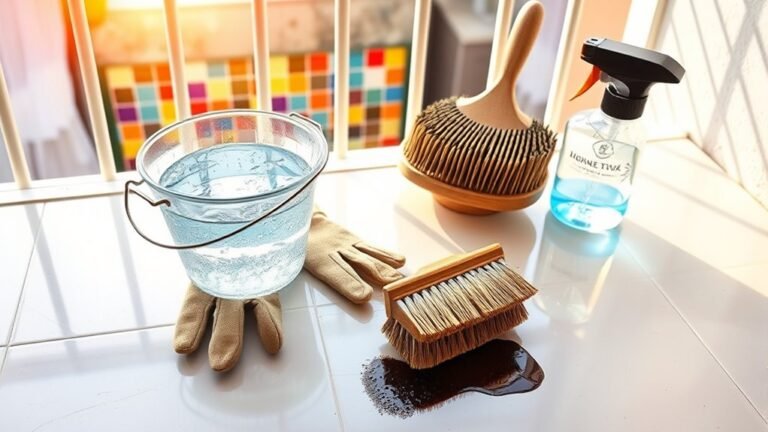Using Essential Oils to Clean Dust
Using essential oils to clean dust is an eco-friendly way to remove allergens and microbes while freshening your space. Oils like eucalyptus, lemon, and tea tree have antimicrobial and anti-inflammatory properties that enhance dust removal and air purification. You can create a gentle dusting spray by diluting essential oils in water and castile soap, applying it with a microfiber cloth for best results. Proper dilution and safety precautions protect surfaces and health. Keep exploring for tips on maximizing their effectiveness and safety.
Benefits of Using Essential Oils for Dusting

Although traditional dusting methods can effectively remove particles, using essential oils offers additional benefits that enhance both cleanliness and indoor air quality. When you incorporate essential oils into your dusting routine, you engage in eco friendly cleaning that reduces reliance on synthetic chemicals. These natural compounds possess antimicrobial properties, which help inhibit the growth of bacteria and mold on surfaces. Furthermore, essential oils create an aromatic experience that elevates your environment, promoting mental clarity and relaxation. By choosing essential oils, you not only capture dust more efficiently but also improve the overall freshness of your living space. This method supports your desire for freedom from harsh chemicals while maintaining a scientifically grounded approach to dust management and air purification. Additionally, essential oils contribute to a safer environment for individuals and families by minimizing exposure to harsh ingredients.
Top Essential Oils for Dust Removal and Air Purification
You’ll find that certain essential oils are particularly effective at trapping dust and purifying the air. Oils like eucalyptus, peppermint, and tea tree contain compounds that reduce airborne particles and inhibit microbial growth. Understanding which scents offer these benefits helps you choose the most efficient options for dust removal and cleaner air.
Best Oils for Dust
When it comes to effectively reducing dust and purifying the air, certain essential oils stand out due to their antimicrobial and anti-inflammatory properties. You can optimize your dusting techniques by selecting oils that not only capture dust but also inhibit microbial growth. Combining these oils enhances efficacy and leaves your environment fresh. Here’s a precise guide to the best oils for dust:
| Essential Oil | Key Property | Ideal Use |
|---|---|---|
| Tea Tree | Antimicrobial | Dusting surfaces |
| Eucalyptus | Anti-inflammatory | Air purification |
| Lavender | Antibacterial | Oil combinations in sprays |
| Lemon | Natural degreaser | Removing sticky dust |
Incorporate these oils into your cleaning routine to harness their full potential for dust control and air purification.
Air Purifying Scents
Three essential oils are particularly effective for both dust removal and air purification due to their combined antimicrobial, anti-inflammatory, and deodorizing properties. Lemon, eucalyptus, and lavender oils improve air quality by reducing airborne dust particles and inhibiting microbial growth. Each oil’s unique scent profile also enhances your environment, promoting a sense of freedom and well-being. Lemon oil’s crisp, citrus aroma energizes the space, while eucalyptus offers a revitalizing, clean scent known for respiratory benefits. Lavender’s floral, calming fragrance not only deodorizes but also reduces inflammation-related allergens. By incorporating these oils into your cleaning routine—whether diffused or mixed with dusting solutions—you actively improve air quality and reduce dust accumulation. This scientific approach guarantees your living space stays fresh, healthier, and more liberating.
How to Make an Essential Oil Dusting Spray

Creating an effective essential oil dusting spray requires combining specific ingredients in precise proportions to maximize cleaning power and fragrance. Start with a base of distilled water (1 cup) and add 1 tablespoon of liquid castile soap to enhance dust capture. Incorporate 15-20 drops of essential oils, selecting scent combinations known for antimicrobial and deodorizing properties, such as lemon and eucalyptus or lavender and tea tree. These spray recipes balance efficacy and aroma, ensuring surfaces are cleaned without residue. Use a clean spray bottle, shake well before each use, and mist lightly over dust-prone areas. This method not only lifts dust efficiently but also leaves behind a revitalizing scent, empowering you to maintain a cleaner environment naturally and freely. Choosing natural fragrances from essential oils also helps reduce allergic reactions while freshening your space.
Incorporating Essential Oils Into Your Cleaning Routine
You can enhance your cleaning routine by integrating essential oils known for their antimicrobial and anti-inflammatory properties. Applying oils through sprays, wipes, or diffusers allows targeted dust removal while improving air quality. Popular choices for dusting include eucalyptus, tea tree, and lavender due to their effectiveness and pleasant aromas. Using essential oils also provides aromatherapy benefits that can make cleaning a more enjoyable and uplifting experience.
Benefits of Essential Oils
Although essential oils have been used for centuries, their integration into modern cleaning routines offers distinct advantages, especially when it comes to dust removal. You benefit from their natural antimicrobial properties, which reduce dust-related allergens and pathogens, enhancing indoor air quality. Additionally, essential oils provide health benefits beyond cleanliness; their volatile compounds support respiratory comfort and may reduce inflammation. The aromatherapy effects are another key advantage—diffusing these oils during cleaning can elevate your mood, reduce stress, and create a more pleasant environment. This dual action of physical cleaning and psychological upliftment aligns with your desire for freedom from harsh chemicals and synthetic fragrances. By incorporating essential oils, you adopt a scientifically supported, holistic approach that optimizes both your environment and well-being.
Application Methods
Incorporating essential oils into your cleaning routine requires selecting appropriate methods that maximize their efficacy against dust and allergens. You can use several application techniques depending on the surfaces you’re targeting. For hard surfaces, dilute essential oils in water or a natural cleaning agent, then apply with a microfiber cloth to trap dust effectively. When dusting delicate areas, consider adding oils to a spray bottle for a fine mist that prevents scattering particles. For fabric surfaces, lightly misting with a diluted solution can reduce dust accumulation without saturation. Always verify oils are properly diluted to avoid residue or surface damage. By choosing the right application techniques tailored to each cleaning surface, you enhance dust removal while enjoying the natural benefits of essential oils.
Best Oils for Dusting
When selecting essential oils for dusting, it’s important to contemplate their antimicrobial properties and natural ability to bind dust particles. Oils like eucalyptus, tea tree, and lavender are effective due to their potent antimicrobial action, reducing bacteria and allergens on surfaces. Lemon and orange oils offer natural degreasing qualities, which help lift and trap dust more efficiently. Incorporating these oils into your DIY cleaning solutions not only enhances dust removal but also provides eco friendly alternatives to chemical cleaners. By mixing a few drops of your chosen essential oil with water or a mild carrier like vinegar, you create a safe, effective dusting spray. This approach lets you maintain a clean environment while respecting your desire for freedom from harsh toxins and synthetic ingredients.
Tips for Effective Dusting With Essential Oils
Because essential oils contain natural antimicrobial and anti-inflammatory compounds, they can enhance the effectiveness of dusting by not only removing particles but also reducing allergens and pathogens. To maximize results, select appropriate dusting techniques such as using microfiber cloths that trap dust efficiently. Combine essential oils like eucalyptus and lemon for their synergistic cleaning and deodorizing properties. Dilute oils in water or a mild carrier to avoid residue buildup. Apply the solution lightly to your cloth rather than directly onto surfaces to preserve material integrity. Regularly change or wash dusting tools to prevent redistribution of allergens. By integrating thoughtful oil combinations with precise dusting techniques, you’ll maintain cleaner environments and enjoy the natural benefits of essential oils without compromising your freedom to clean effectively. Additionally, incorporating natural substances like vinegar and baking soda in your cleaning routine can complement essential oils for a thorough and eco-friendly approach.
Precautions When Using Essential Oils for Cleaning

While combining essential oils with effective dusting methods can improve cleaning outcomes, you should be aware of certain precautions to guarantee safe and ideal use. First, follow strict safety guidelines: always dilute essential oils properly to prevent surface damage and skin irritation. Test mixtures on small, inconspicuous areas before widespread application. Avoid direct inhalation or prolonged exposure, as some oils can cause respiratory irritation. Be mindful of potential allergic reactions—if you or others experience redness, itching, or coughing, discontinue use immediately. Keep oils out of reach of children and pets, as ingestion or concentrated exposure may be harmful. By adhering to these precautions, you’ll enjoy the benefits of essential oils in your cleaning routine while maintaining a safe environment that respects your freedom to clean effectively and responsibly.
Frequently Asked Questions
Can Essential Oils Prevent Dust Mites From Breeding?
You might wonder if essential oils can prevent dust mites from breeding. Scientific studies show that certain essential oils, like tea tree, eucalyptus, and lavender, have acaricidal properties that inhibit dust mite growth and reproduction. While they don’t completely eliminate dust mites, using these oils in your cleaning routine can reduce their population. So, incorporating essential oils offers a natural way to control dust mites, giving you more freedom from allergens.
Are Essential Oils Safe to Use Around Pets When Dusting?
Pet safety should steer your selection when considering essential oil safety during dusting. Certain oils can cause adverse pet reactions, like respiratory distress or skin irritation, especially in cats and small animals. You’ll want to avoid oils like tea tree, eucalyptus, and peppermint. Instead, opt for pet-friendly oils and always dilute them properly. Ascertain good ventilation and monitor your pets closely to maintain a safe, scent-savvy space for everyone’s freedom and health.
How Long Does the Scent of Essential Oils Last After Cleaning?
The scent longevity of essential oils after cleaning typically lasts anywhere from a few hours to a couple of days, depending on the oil’s volatility and your environment’s airflow. While scent longevity adds a pleasant aroma, it doesn’t directly impact cleaning efficacy, which relies on the oils’ antimicrobial properties. To balance both, you might choose oils known for lasting fragrance and proven cleaning power, ensuring your space feels fresh without compromising cleanliness.
Can Essential Oils Be Used on Electronic Devices for Dusting?
Ever wondered if you can safely use essential oils on your gadgets? When it comes to electronic safety, you need to be cautious. Essential oils are concentrated and can leave residues that may harm delicate components. For oil application on electronic devices, dilute oils with water or use a microfiber cloth lightly dampened with the mixture. Avoid spraying directly and guarantee devices are powered off to maintain both cleanliness and safety.
Do Essential Oils Help With Allergy Symptoms Caused by Dust?
You might find essential oils provide some allergy relief thanks to their anti-inflammatory and antimicrobial properties. Oils like eucalyptus, peppermint, and lavender can help reduce nasal congestion and soothe irritated airways caused by dust exposure. However, essential oil benefits vary individually and shouldn’t replace medical treatments. Using them in diffusers or diluted topical applications can support your respiratory comfort, but always verify you’re not sensitive or allergic to the oils themselves.






